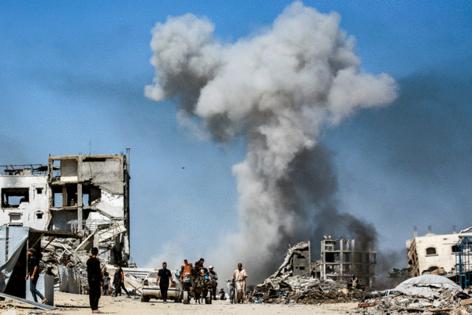Germany weighs curbs on Israel arms exports on Gaza concerns
Published in News & Features
Germany is considering restrictions on military exports to Israel over concerns about civilian suffering in Gaza, a notable shift from one of the country’s biggest weapons suppliers.
While Germany will continue to support Israel, the extent of its backing will be discussed internally by the government, Chancellor Friedrich Merz said Tuesday during a visit to Finland. He didn’t specify a time frame or what proposals were under consideration, and added that decisions might not be made public.
“We are appalled by the terrible suffering of the civilian population,” Merz said in the Finnish city of Turku. “The massive military strikes by the Israeli army in the Gaza Strip no longer make any sense to me as to how they serve the goal of fighting terrorism and freeing the hostages.”
European Commission President Ursula von der Leyen on Tuesday echoed Merz’s tone, criticizing Israel’s military operations in Gaza. She said military operations targeting civilian infrastructure, including a school that served as a shelter for displaced Palestinian, was “abhorrent.”
After starting his term earlier this month, Merz has taken a more critical tone on Israel than his predecessor, Olaf Scholz. The approach is in part a reaction to domestic pressure as well as an effort to align with European partners, as Merz seeks solidarity within the region as it confronts Russia over its war in Ukraine and contents with tense relations with Donald Trump’s U.S.
Germany has long been a staunch supporter of Israel and considers protecting the state part of its obligations to atone for Nazi atrocities. The country also often equates criticism of Israel with antisemitism. The complexities make any shift in policy a loaded issue.
“It seems to me that the time has come when I have to say publicly that what is currently happening is no longer understandable,” said Merz, head of the conservative Christian Democratic Union.
As Israel mounts a push to win the more than 19-month-old war, troops are under orders to conquer Gaza, move civilians toward a southern buffer zone and recover the remaining 58 hostages held by Hamas, which is classified as a terrorist group by Europe and the U.S.
Amid blockades of humanitarian aid, images of starving and injured children and bombed out hospitals have made an impact in Germany. More than half of people surveyed by Civey for the Tagesspiegel newspaper said it was wrong for Germany to export weapons to Israel. Political dissent has also intensified.
“German weapons must not be used to spread humanitarian disasters and violate international law,” Adis Ahmetovic, foreign policy spokesman for the co-ruling Social Democrats, said in an interview with Stern magazine.
On Monday, Vice Chancellor Lars Klingbeil from the SPD said the German government will discuss “further steps” on Israel, when asked about a potential ban on weapons exports. Other options could include a reduction of deliveries or restrictions on usage.
Due to its historical responsibility, Germany should hold back more than any other country in the world when it comes to publicly lecturing Israel, Merz said on Monday at a conference on European policy.
“But if lines are crossed — where international humanitarian law is now really being violated — then Germany, the German chancellor, must also say something about it,” he said.
---------
—With assistance from Jorge Valero.
©2025 Bloomberg L.P. Visit bloomberg.com. Distributed by Tribune Content Agency, LLC.







Comments